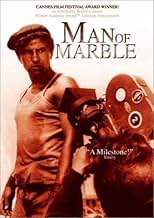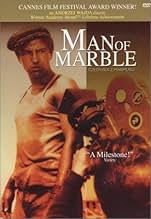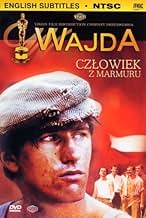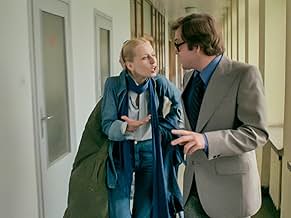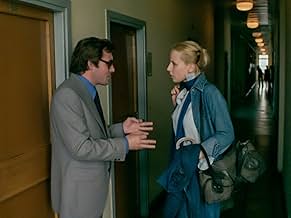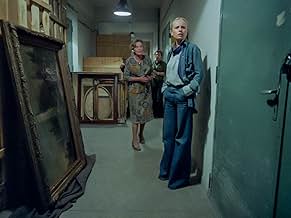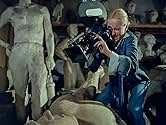AVALIAÇÃO DA IMDb
7,7/10
5,1 mil
SUA AVALIAÇÃO
Adicionar um enredo no seu idiomaA young Polish filmmaker sets out to find out what happened to Mateusz Birkut, a bricklayer who became a propaganda hero in the 1950s but later fell out of favor and disappeared.A young Polish filmmaker sets out to find out what happened to Mateusz Birkut, a bricklayer who became a propaganda hero in the 1950s but later fell out of favor and disappeared.A young Polish filmmaker sets out to find out what happened to Mateusz Birkut, a bricklayer who became a propaganda hero in the 1950s but later fell out of favor and disappeared.
- Direção
- Roteirista
- Artistas
- Prêmios
- 4 vitórias e 1 indicação no total
Avaliações em destaque
If 165 minutes seems like a long time to watch a film about a Polish bricklayer who becomes a symbol for over-achievement under the Soviet state, well, it probably is, but the film is not as dry as it might sound, and it's worth watching. Wajda adds an extra layer to the story by showing a young woman director (Krystyna Janda) using filmmaking in the 1970's as a means of uncovering the truth about what happened to this guy, and it's interesting when we see that filmmaking two decades earlier had been a means of creating his image. Just as with the communist statues and artwork from the era which show clean-cut, strong, contented workers, it was a director who came up with the idea for the bricklaying challenge in order to extol the virtues of the ideal worker under communism. Despite all this, the bricklayer (Jerzy Radziwilowicz) has an endearing innocence about him. He really wants to do a good job and to set a record, and later fights to try to find his buddy who has been imprisoned. He seems like a symbol of the Polish people of the period, and it's telling this his fate remains unknown and ambiguous for most of the film.
In poking at the so-called Stakhanovite worker, those who outperformed others but then faced resentment and backlash, Wajda deftly shows how it was all based on lies. He also shows a worker falsely imprisoned, the corruption of the state, and the soullessness of the Soviet-era construction projects ("what architecture," one muses), which is pretty impressive stuff to get produced in 1977, but then again, Wajda pushed boundaries throughout his career. I loved seeing the old archival footage of the actual construction of Nowa Huta and the anti-American propaganda, and I also loved the strength of Janda's character. She's a complete badass, striking her defiant poses in bell bottoms and set to 1970's funk/disco music. Wajda's filmmaking itself is a bit workmanlike but she helps bring it to life, and as with several of his other films, this seems essential as a document of Poland over the second half of the 20th century. I probably would have rated it higher in 1977, and even now debated a higher rating.
In poking at the so-called Stakhanovite worker, those who outperformed others but then faced resentment and backlash, Wajda deftly shows how it was all based on lies. He also shows a worker falsely imprisoned, the corruption of the state, and the soullessness of the Soviet-era construction projects ("what architecture," one muses), which is pretty impressive stuff to get produced in 1977, but then again, Wajda pushed boundaries throughout his career. I loved seeing the old archival footage of the actual construction of Nowa Huta and the anti-American propaganda, and I also loved the strength of Janda's character. She's a complete badass, striking her defiant poses in bell bottoms and set to 1970's funk/disco music. Wajda's filmmaking itself is a bit workmanlike but she helps bring it to life, and as with several of his other films, this seems essential as a document of Poland over the second half of the 20th century. I probably would have rated it higher in 1977, and even now debated a higher rating.
"Czlowiek z marmuru" ("Man of Marble") goes to tells us the story of a filmmaker (Krystyna Janda) who wants to make as a film thesis a documentary about one of the heroes of Poland's communist regime, a simple man named Mateusz Birkut (Jerzy Radziwilowicz), a bricklayer who was famous for building housing for all the people, and that made him a cult figure in his country. She is trying to find Birkut, a popular figure that vanished without any explanation and she'll try to discover what happened with this mythic figure. Interviewing those who knew him and watching old footage of him, the filmmaker will make a great work about this man but her bosses who owns the funds (the Socialist government funds) for the film's realization are not very happy with her film, thinking that this might be a damaging project for them.
If the story sounds a little like "Citizen Kane" well, be ready for countless flashbacks, back and forth in the past of Birkut, and an almost inconclusive ending just like Welles masterpiece. But wait! The ending of this journey appears in "Man of Iron" (1981), also directed by the great Andrzej Wajda.
"Man of Marble" (term that refers to the propagandistic marble statues made in Birkut's image) is a powerful and brilliant story about the importance of past in the lives of everyone, it's the thing that makes us look for the future with better eyes, and in the film, we are constantly dragged down to it in order to get some answers about Birkut's future: Is he alive? Is he dead? Why he disappeared? Not just that, it is a great accomplish in showing how documentaries are made, both the protagonist work but the ones made up by the government, where Birkut and his friends were "trained" to appear important in front of camera. And, of course, a political and historical background that reveals many things about Poland and how strict the society were back in the 1950's and even in the 1970's with an absolute control on everything filmed, said and all.
Unique in many senses, "Man of Marble" present us the sad reality of Communism with masked realities where everything presented as good but in the surface it wasn't all good, and Birkut realizes that after a painful incident and after the suspicion that his friend was a spy, something that he never agreed, and that made him fight with the ones who put him on a good position among people, the government.
It is a well made film, with terrific performances by the cast, and a magnificent screenplay that knows how to evoke many times, many periods of Poland without being confusing (something that was problematic in its sequel), everything works fine. Bravo, Mr. Wajda. 10/10
If the story sounds a little like "Citizen Kane" well, be ready for countless flashbacks, back and forth in the past of Birkut, and an almost inconclusive ending just like Welles masterpiece. But wait! The ending of this journey appears in "Man of Iron" (1981), also directed by the great Andrzej Wajda.
"Man of Marble" (term that refers to the propagandistic marble statues made in Birkut's image) is a powerful and brilliant story about the importance of past in the lives of everyone, it's the thing that makes us look for the future with better eyes, and in the film, we are constantly dragged down to it in order to get some answers about Birkut's future: Is he alive? Is he dead? Why he disappeared? Not just that, it is a great accomplish in showing how documentaries are made, both the protagonist work but the ones made up by the government, where Birkut and his friends were "trained" to appear important in front of camera. And, of course, a political and historical background that reveals many things about Poland and how strict the society were back in the 1950's and even in the 1970's with an absolute control on everything filmed, said and all.
Unique in many senses, "Man of Marble" present us the sad reality of Communism with masked realities where everything presented as good but in the surface it wasn't all good, and Birkut realizes that after a painful incident and after the suspicion that his friend was a spy, something that he never agreed, and that made him fight with the ones who put him on a good position among people, the government.
It is a well made film, with terrific performances by the cast, and a magnificent screenplay that knows how to evoke many times, many periods of Poland without being confusing (something that was problematic in its sequel), everything works fine. Bravo, Mr. Wajda. 10/10
Wajda's MAN OF MARBLE is one of the most compelling attacks on government corruption that I have ever seen. It is a "Citizen Kane"-styled story of a female film student who tries to trace the history of Birkut, a long-forgotten "hero" of the Polish Communist government.
She begins by viewing propaganda film that praises Birkut as a devout worker who slaves away at brick-laying for the officials. He has the appearance of a vigilant, Hercules-like strongman who breezes through the labor without breaking a sweat. Then she goes to interview the director, who was hired by the government. He tells her about the reality of making the film, such as how Birkut was given extra food and water (unlike the other bricklayers). Wajda uses these two conflicting scenes to deconstruct the false imagery that propaganda gives its viewers. He shows us how officials manipulate such situations to their own political good.
The student goes on to interview other subjects who describe the brutal reality of Birkut's off-camera existence. In one devastating scene, she meets his wife, who breaks down and tries to avoid being interviewed. As the truth becomes clearer and clearer, the government begins to intercede in the production of the student's film.
Wajda was a film-maker who was not afraid to criticize the harsh Polish government that eventually was defeated by individuals such as Lech Walesa. MAN OF MARBLE is a testament to those who had to live through the oppression of Communism, and also to those who are still living under its iron fist.
She begins by viewing propaganda film that praises Birkut as a devout worker who slaves away at brick-laying for the officials. He has the appearance of a vigilant, Hercules-like strongman who breezes through the labor without breaking a sweat. Then she goes to interview the director, who was hired by the government. He tells her about the reality of making the film, such as how Birkut was given extra food and water (unlike the other bricklayers). Wajda uses these two conflicting scenes to deconstruct the false imagery that propaganda gives its viewers. He shows us how officials manipulate such situations to their own political good.
The student goes on to interview other subjects who describe the brutal reality of Birkut's off-camera existence. In one devastating scene, she meets his wife, who breaks down and tries to avoid being interviewed. As the truth becomes clearer and clearer, the government begins to intercede in the production of the student's film.
Wajda was a film-maker who was not afraid to criticize the harsh Polish government that eventually was defeated by individuals such as Lech Walesa. MAN OF MARBLE is a testament to those who had to live through the oppression of Communism, and also to those who are still living under its iron fist.
'Man of marble' is usually seen as an bold, anti-communist movie which is strikingly accurate at the deep level of practices within communist countries. Indeed, trough a story of a student who tries to make a graduation film Wajda beautifully succeeds in describing at the same time the soft violence of the '70s in Poland and the totally different hardcore 'prison' violence of the Stalinist regime in the 50's. Hence, it is gradually revealed trough the eye of the camera the contrast between the heroic, raw atmosphere of the first communist years and the light perestroika of the present cinematographic time. Nonetheless, there is a common thread throughout the movie as the all-pervading party monopoly deeply affects everybody and no one has the option of an Utopian escape.
The no exit strategy is probably for me the main theme of the movie. The rebellious young girl who tries to see beneath the propaganda images is also on psychoanalytical trip to confront her family history.
There are two scenes which can more or less summaries the story: in the first one, we can see her right at the beginning in a rough quarrel with her Television supervisor, and we can consequently grasp the theme of the incessant conflict with the authority. However, if on the one level wecan see her rejecting the father figure, on the second level we can witness desire as the film maker is practically possessing the hero statue which she finds in a basement of a museum.
Well, basically the catch of the movie is the intertwine of the story with the girl on the way of her desire and the political level which makes this trip also a trip of a historical clearing up. And, in the strange development of we find that the "fake" hero is in fact an authentic one and that we did know the secret of the narrative - the "hero"(the father, the phallus) of the propaganda is the "true" hero, as he had to face real tough moral problems and he lived "the life in truth" . The heroine can develop at last real emotional attachment with the paternal image and she eventually can end her trip by accepting an ally and a friend in the final scene.
The no exit strategy is probably for me the main theme of the movie. The rebellious young girl who tries to see beneath the propaganda images is also on psychoanalytical trip to confront her family history.
There are two scenes which can more or less summaries the story: in the first one, we can see her right at the beginning in a rough quarrel with her Television supervisor, and we can consequently grasp the theme of the incessant conflict with the authority. However, if on the one level wecan see her rejecting the father figure, on the second level we can witness desire as the film maker is practically possessing the hero statue which she finds in a basement of a museum.
Well, basically the catch of the movie is the intertwine of the story with the girl on the way of her desire and the political level which makes this trip also a trip of a historical clearing up. And, in the strange development of we find that the "fake" hero is in fact an authentic one and that we did know the secret of the narrative - the "hero"(the father, the phallus) of the propaganda is the "true" hero, as he had to face real tough moral problems and he lived "the life in truth" . The heroine can develop at last real emotional attachment with the paternal image and she eventually can end her trip by accepting an ally and a friend in the final scene.
I'm surprised that this great film hasn't gotten more comments. In any case, the previous reviews really nail the film pretty well. I only want to add that the filmmaker within the film, Agnieszka (played by Krystyna Janda), is such a fiercely dedicated artist that she really commands our attention in every scene she's in. Sneaky, smart, with a deep cunning and a sly sense of humor, she is the real hero of the film. I love the many scenes where she steals mischievous glances at her co-workers while collecting the provocative material for her film.
Watch for the scene where she kicks her sound man in the shin. Also especially memorable is her encounter with a more successful film director, who she must persuade to be interviewed. She simply walks up to his car, bends down and looks in at him, with a blank expression on her face, and stares at him. It's as if she's persuading him by sheer force of will! Truly a great film, and a great performance.
Watch for the scene where she kicks her sound man in the shin. Also especially memorable is her encounter with a more successful film director, who she must persuade to be interviewed. She simply walks up to his car, bends down and looks in at him, with a blank expression on her face, and stares at him. It's as if she's persuading him by sheer force of will! Truly a great film, and a great performance.
Você sabia?
- CuriosidadesThe award Burski is flaunting at the airport on his return was Wajda's own award, hence Burski is a mock self-portrait.
- ConexõesEdited into Salve a Vida (Quem Puder) (1981)
Principais escolhas
Faça login para avaliar e ver a lista de recomendações personalizadas
- How long is Man of Marble?Fornecido pela Alexa
Detalhes
- Tempo de duração
- 2 h 45 min(165 min)
- Cor
- Mixagem de som
- Proporção
- 1.37 : 1
Contribua para esta página
Sugerir uma alteração ou adicionar conteúdo ausente


